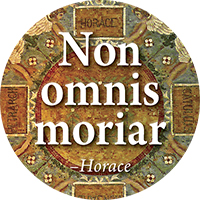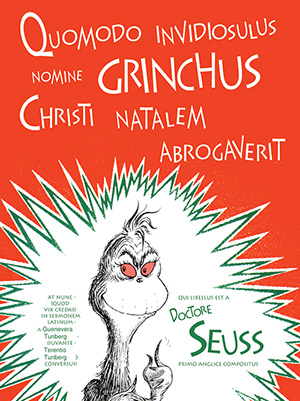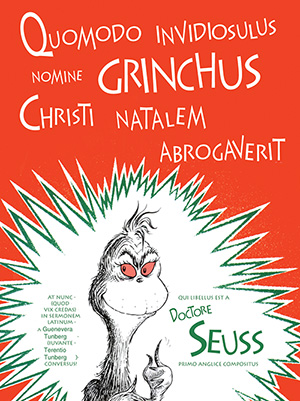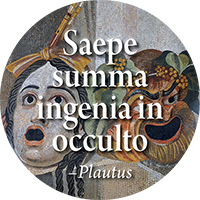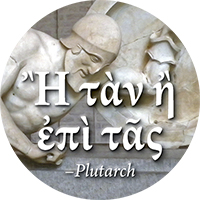Non est ad astra mollis e terris via:The trip from the earth to the stars is not an easy one
- P6
- P6
- Button
Seneca's words work well with this photograph of the Eagle nebula, "Pillars of Creation," captured by NASA's Hubble Space Telescope.
Non omnis moriar: Not all of me shall die.
- P22
- P22
- Button
The name of the poet resides in this ceiling mosaic from the Library of Congress in Washington, DC.
Octavus Octopus: Octavus the Octopus
- Author: Rose R. WilliamsIllustrator: James Hillyer Estes
- 6986
- 978-0-86516-698-1
- Paperback
- 28
Octavus Octopus is the second of the four-book "I Am Reading Latin Stories" Series. Each book is independent, but Octavus has a few more words than does the first book Ursus et Porcus and makes use of a little more grammar.
Princess, Priestess, Mother, Wolf Fabula de Romulo et Remo
- 8776
- 978-0-86516-877-0
Encounter a retelling of Rome’s foundation legend unlike any other—entirely in Latin!
Quomodo Invidiosulus nomine GRINCHUS Christi natalem Abrogaverit How the Grinch Stole Christmas in Latin
- Author: Theodor "Dr. Seuss" Geisel
- 4193
- 978-0-86516-419-2
- Hardbound
- 64
Quomodo Invidiosulus nomine GRINCHUS Christi natalem Abrogaverit (The Latin version of How the Grinch Stole Christmas) features Dr. Seuss' original artwork and a translation that echoes the love of word play and the rhythmic narrative of the world's best-selling author of children's books. Jennifer Morrish Tunberg and Terence O. Tunberg recreate the enchanting poetry of the English original.
Quomodo Invidiosulus nomine GRINCHUS Christi natalem Abrogaverit: How the Grinch Stole Christmas in Latin
- Author: Theodor "Dr. Seuss" Geisel
- 4207
- 978-0-86516-420-8
- Paperback
- 64
Quomodo Invidiosulus nomine GRINCHUS Christi natalem Abrogaverit (The Latin version of How the Grinch Stole Christmas) features Dr. Seuss' original artwork and a translation that echoes the love of word play and the rhythmic narrative of the world's best-selling author of children's books. Jennifer Morrish Tunberg and Terence O. Tunberg recreate the enchanting poetry of the English original.
Rena Rhinoceros: Rena the Rhinoceros
- Author: Rose R. WilliamsIllustrator: James Hillyer Estes
- 6994
- 978-0-86516-699-8
- Paperback
- 24
Rena Rhinoceros is the fourth of the four-book "I Am Reading Latin Stories" Series. Each book is independent, but Rena has a few more verb forms than the first three books and explanations for them.
Rex quondam, Rexque futurus: The once and future king
- P25
- P25
- Button
Malory's words, said to be on the tomb of King Arthur, appear here alongside Arthur, as seen on the Christian Heroes Tapestry in New York's Metropolitan Museum of Art.
Saepe summa ingenia in occulto: Often the greatest minds lie hidden.
- P4
- P4
- Button
Theatrical masks on a Roman mosaic from the Capitoline Museums drive home Plautus's point.
Sed quis custodiet ipsos custodes? :But who will guard the guards themselves?
- P13
- P13
- Button
This line from Juvenal works well with this image of soldiers from Hadrian's Column in Rome.
Shock-Headed Peter: in Latin - English - German
- Author: Heinrich Hoffmann
- 5483
- 978-0-86516-548-9
- 109
You'd REALLY better watch out: cautionary tales that will curl your hair, too: in Latin, German, English
Dr. Heinrich Hoffmann's Der Struwwelpeter, the best known German children's book, was first published in Frankfurt in 1845. "Shock-Headed Peter" or "Slovenly Peter" (as it is mostly known in English speaking countries) has conquered the children's book market of the world not only with dozens of translations but also literally hundreds of imitations, adaptations, take-offs and parodies. These "merry stories and funny pictures for children between 3 and 6 years," as Dr. Hoffmann termed them, are cautionary tales, by turns macabre, touching, and wickedly funny. Where else does every recalcitrant child or cruel adult get his or her "deserts," and that within a few pages?
Son, come home with your shield or on it - Greek
- P29
- P29
- Button
This dying warrior, now in Munich, from the Temple of Aphaea at Aegina, Greece, falls with his shield in hand behind this line from Plutarch.


